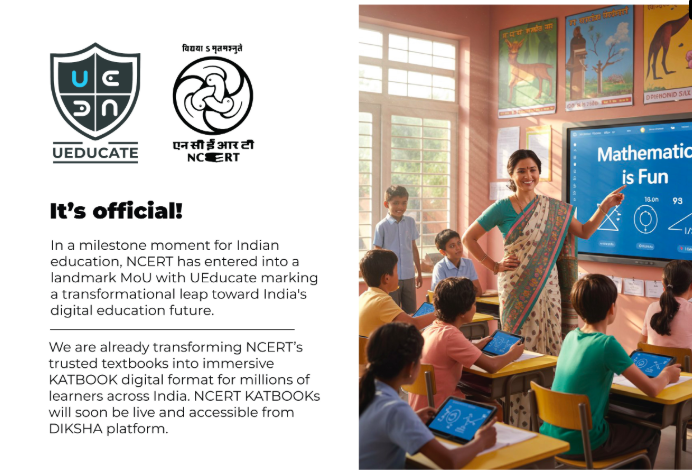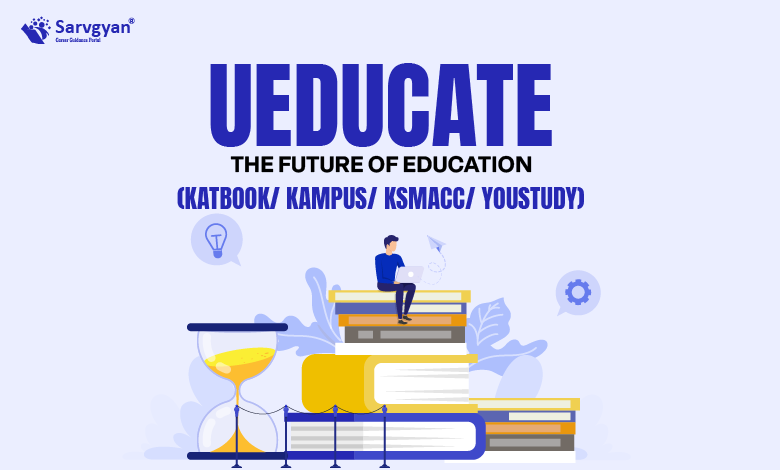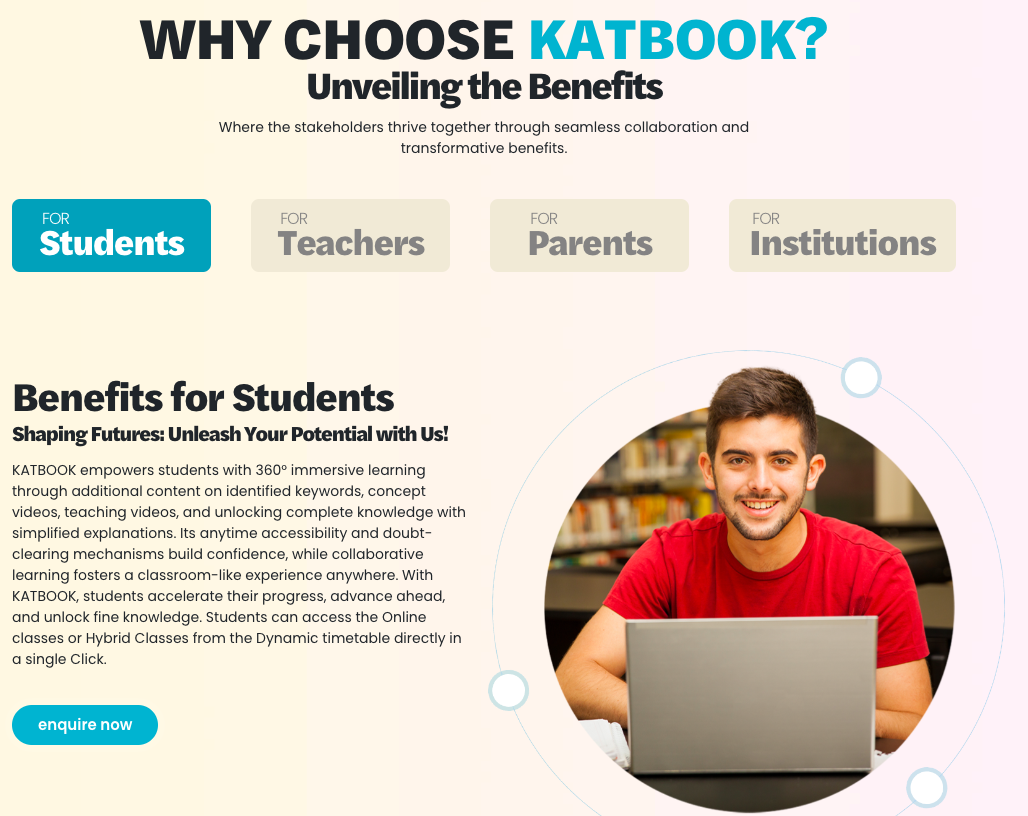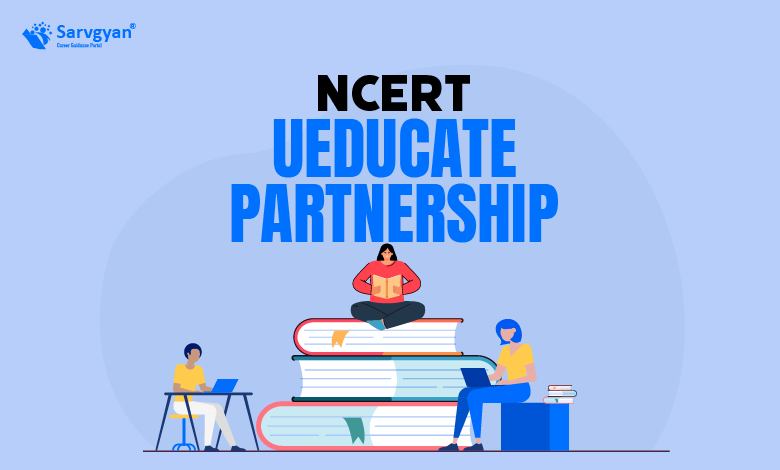The National Council of Educational Research and Training (NCERT) has partnered with UEducate Global to launch KATBOOK, a platform designed to modernize how students study NCERT textbooks.
This is not just another e-book or PDF repository; KATBOOK integrates technology to create a more interactive, engaging, and accessible learning environment for students across India.
The goal is simple: bridge the gap between traditional textbooks and digital learning, so every student, whether in a metro city or a remote village, can benefit from modern education tools.

About UEducate
UEducate Global is an education technology company known for creating digital tools that simplify learning and teaching. Their products are built to be user-friendly, affordable, and compatible with different devices, from basic smartphones to high-performance computers.
Over the years, UEducate has expanded its portfolio to cater to schools, teachers, and students through multiple platforms. UEducate offers a suite of products designed to enhance teaching and learning outcomes:
- KATBOOK
- KAMPUS
- KSMACC
- YOUSTUDY
Each product serves a different purpose. KATBOOK focuses on interactive textbooks, KAMPUS helps schools manage digital classrooms, KSMACC supports academic performance tracking, and YOUSTUDY offers personalized, self-paced learning experiences. Together, these platforms show UEducate’s vision of making quality education accessible and inclusive.

What is KATBOOK
KATBOOK is a smart digital version of NCERT books, enriched with multimedia tools. It’s built to help students understand concepts better, not just read them.
Imagine a student in Class 8 learning about the solar system. Instead of only reading about planets in a textbook, they can now watch interactive videos, explore 3D models, and attempt quizzes that make the topic more memorable.
KATBOOK isn’t just about convenience. It’s about giving students multiple ways to absorb information — visual, auditory, or interactive, depending on how they learn best. Another major advantage is its offline capability. Students in rural areas with weak or inconsistent internet can still download lessons and access them anytime.

Key Features of KATBOOK
KATBOOK isn’t just a digital book; it’s a smart platform designed to make learning interactive and accessible. Here are the standout features students and teachers can benefit from:
- Interactive Multimedia Lessons – Chapters explained through visuals, audio, and animations that make learning more engaging.
- Virtual Labs and Simulations – Science experiments done digitally, letting students practice safely and repeat experiments for better understanding.
- AI-Powered Support – Instant translation for regional languages, built-in dictionaries for complex terms, and voice guides to help with reading support.
- Offline Access – Downloadable lessons for students in areas with weak or no internet connectivity.
- Multi-Device Compatibility – Works smoothly on phones, tablets, or computers, making it accessible anytime, anywhere.
School Education in India: History, Modern Schooling, Edu Boards
How KATBOOK Helps Students
For students, KATBOOK is more than a tool; it’s a learning companion because of the following details given below:
- It turns plain reading into active learning through interactive exercises, quizzes, and visual aids.
- Students can learn at their own pace by replaying videos or reviewing chapters as often as needed.
- With offline mode, students in areas with limited internet are not left behind.
For example, a Class 11 student is not able to understand Physics; he is struggling. To make the concept or chapter clear can watch animations of motion and force concepts or practice with virtual problems until they fully grasp the topic. This builds confidence and helps students score better in exams.

Benefits of KATBOOK for Teachers
The KATBOOK is not only helpful for students, but teachers also stand to gain from KATBOOK. The platform is designed to save time and improve teaching quality.
- Ready-to-use lesson plans with multimedia activities for each chapter.
- Easy-to-create quizzes and instant assessments to evaluate students quickly.
- Tools for sharing resources and managing assignments in digital classrooms.
Via the KATBOOks, teachers’ time in preparing study material and spending hours in research will be saved, and they will focus more on teaching and guiding students.
Why the NCERT–UEducate Partnership Matters
This partnership is a significant step toward implementing the National Education Policy (NEP) 2020, which emphasizes digital learning and experiential education.
By combining NCERT’s trusted academic content with UEducate’s technology, KATBOOK makes quality education accessible to every student, whether they are in urban schools or rural classrooms with limited infrastructure.
It also signals a shift in how education in India is adapting to modern challenges — blending traditional learning with digital tools to create a balanced, future-ready system.

Future Plans for KATBOOK
KATBOOK will grow in stages. It will start with core subjects for Classes 6 to 12, and gradually expand to cover more grades, including primary levels. The platform also plans to introduce tools for skill-based learning and better analytics to support teachers in guiding students effectively.
To make it accessible to everyone, updates will focus on adding regional language options, real-time doubt-solving features, and training resources for teachers. The idea is simple: to make learning smarter, easier, and available to every student, no matter where they are.
Conclusion
KATBOOK represents a major shift in education. It’s about making learning inclusive, interactive, and student-friendly. Students no longer have to rely solely on heavy textbooks or limited classroom hours. Instead, they can learn anywhere, anytime, with a platform that adapts to their needs.
For teachers and schools, KATBOOK simplifies lesson planning and classroom engagement. And for parents, it provides peace of mind that their children are learning in a modern, effective way. As India moves forward with digital education, partnerships like NCERT and UEducate are setting the stage for a future where every child, regardless of geography or resources, can have equal access to quality education.
We hope you find this article helpful and useful. Our comment section is below. Feel free to ask any questions or doubts you may have regarding anything.